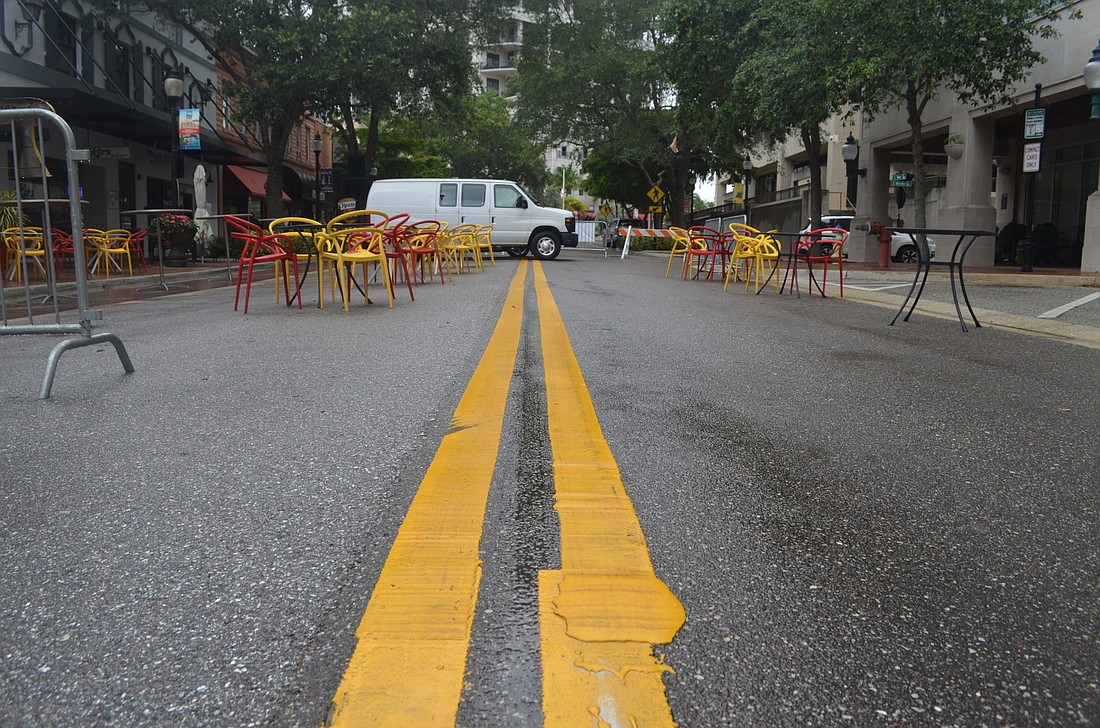- May 1, 2025
-
-
Loading

Loading

A rainy Memorial Day weekend didn’t dampen business at El Melvin Cocina Mexicana. The Main Street restaurant reported its best week of sales since COVID-19 shutdowns began.
The increased activity came the same weekend the city closed a portion of Main Street in front of El Melvin to vehicular traffic, which allowed the restaurant to expand its outdoor dining setup into the road.
Co-Owner Jeff Good said El Melvin had done about 40% of pre-closure business after Gov. Ron DeSantis allowed restaurants to reopen at reduced capacity earlier this month. But the week of May 18, Good said the business nearly hit the same level it had before the closures. Good credited the street closures as contributing to the success, stating he got positive feedback from diners and pedestrians alike.
“I can say without a doubt the response from a customer standpoint was strong,” Good said.
Naturally, Good hopes the city will make the closures a longer-term initiative as businesses continue to face operational challenges associated with the coronavirus. But in the wake of last weekend’s trial run — which closed a portion of the 1300 block of Main Street and a segment of State Street — it’s not yet clear how the city will handle things moving forward.
City spokesman Jason Bartolone said the city is interested in continuing to experiment with street closures over the next month. He said the city intends to work with the Sarasota Downtown Enrichment Association, a merchants group with more than 400 members, on coordinating any closures. Specific plans for future closures were not immediately available.
Ron Soto is president of the Sarasota Downtown Enrichment Association. As of Wednesday morning, he said he hadn’t yet heard significant feedback either way on how the test closures went. But an informal email survey of association members showed a 60/40 split on the prospect of pedestrianizing streets downtown — with 60% opposing the concept.
Those critical of the closures have expressed concern about losing on-street parking spots and questioned the benefits for businesses that can’t easily capitalize on expanded outdoor space. The city attempted to balance those concerns by beginning the closures after 4 p.m. Friday and Saturday. Still, Soto said satisfying all stakeholders would be tricky.
“That’s exactly the challenge we’re having,” Soto said. “You help out one industry, the restaurants, by closing the streets, and you shoot the foot of the people who have the dress stores, the hair cutters, the jewelry stores.”
Although some businesses and officials staunchly oppose or support closing streets, there are splinters within the broader debate. At the May 18 City Commission meeting, Commissioner Liz Alpert expressed concern the city’s attention might be too narrowly focused on businesses within the downtown core and suggested the benefits could extend elsewhere in Sarasota.
The owner of 99 Bottles, a craft beer bar and store on Second Street, has argued that even within the downtown core, conversations about how to best use public space have not been managed equitably. Mark Tuchman wrote an email to commissioners earlier this month that detailed how state regulations limited his indoor capacity to one customer at a time. With expanded outdoor space for tables, Tuchman said he could place four tables outside with proper social distancing and potentially earn enough to pay his monthly rent.
In that same email, however, Tuchman encouraged commissioners not to pursue a street closure if it only applied to Main Street.
“If passed, it will be a windfall for those businesses that front those select blocks in downtown Sarasota,” Tuchman wrote. “But what about all of the other businesses in the city?”
City Commissioner Hagen Brody has been an outspoken advocate for implementing street closures. At the May 18 commission meeting, Brody was critical of City Manager Tom Barwin for not taking more decisive action to implement street closures on a broader scale. Brody said a lack of consensus among businesses was not a reason to hold back. He believes some fears from opponents would not materialize, and he believes that the benefits of pedestrianizing streets outweighs any negatives.
In addition to helping businesses, Brody emphasized the safety benefits of closing streets to vehicles.
“The point is to give people the space they need to protect themselves to stay away from other people and still come downtown to eat,” Brody said.
Even as the state moves forward in the reopening process, Good said continuing to offer opportunities to use outdoor space would be beneficial for businesses forced to operate at reduced capacity. Good said he hoped the closures would continue, but he acknowledged the needs of his business are not universal.
“I know it’s a delicate balance,” Good said.